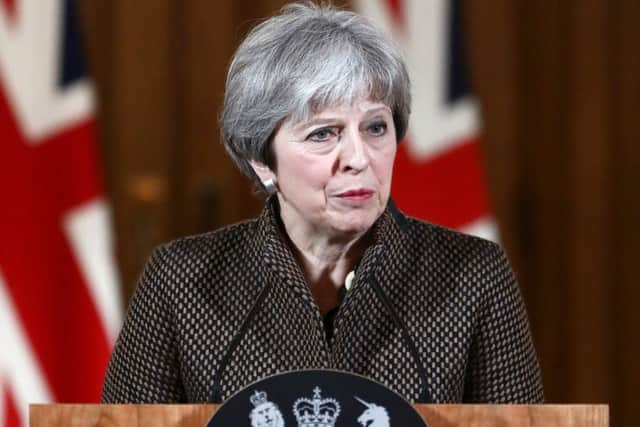Theresa May forced to justify Syria strikes after SNP pressure
In a Commons statement, Mrs May will say Saturday’s attack on the Syrian regime could not wait for parliamentary approval or a UN mandate.
However, with anger growing over the government’s refusal to recall parliament ahead of military action, ministers will use parliamentary procedure usually reserved for opposition parties to ask the Commons Speaker for an emergency debate.
Advertisement
Hide AdAdvertisement
Hide AdThe Scotsman understands that an SNP request under standing order 24 of the House of Commons rules was submitted on Friday, leaving ministers with little choice but to accept demands for a full parliamentary debate.


In addition, Conservative MPs were issued a three-line whip yesterday instructing them to be in parliament tomorrow afternoon, amid rising speculation the government could be forced into granting a vote to rubber-stamp the military action in Syria.
Yesterday, Labour leader Jeremy Corbyn called for debate on a ‘War Measures Act’ that would limit the government’s power to go to war without the approval of parliament.
British fighter jets joined French and US forces in launching missiles at a handful of Syrian government military installations in retaliation for a chemical attack on the rebel-held town of Eastern Ghouta two weeks ago.


Mrs May will tell MPs: “We are confident in our own assessment that the Syrian regime was highly likely responsible for this attack and that its persistent pattern of behaviour meant that it was highly likely to continue using chemical weapons. Furthermore, there were clearly attempts to block any proper investigation, as we saw with the Russian veto at the UN earlier in the week. And we cannot wait to alleviate further humanitarian suffering caused by chemical weapons attacks.”
However, polling suggests most voters believe the Prime Minister was wrong to order bombing raids on Syria without parliamentary approval. A Survation poll found 54 per cent opposed the move compared to 30 per cent who backed Mrs May.
Mrs May has not ruled out the UK taking part in further action against Bashar al-Assad’s regime, with the US president warning at the weekend that allied forces were “locked and loaded”.
While the government could expect to win a vote on Syrian airstrikes with the support of Labour MPs, it would represent a potentially damaging risk to Mrs May’s authority.
Advertisement
Hide AdAdvertisement
Hide AdFormer Prime Minister David Cameron failed to get the support of parliament when he sought approval for airstrikes against the Syrian government following a chemical attack in 2013, throwing the international response to the crisis into disarray.
Yesterday Nicola Sturgeon claimed western allies had failed to exhaust all diplomatic means to pressure the Syrian government into abandoning its chemical weapons and called for an emergency debate within 48 hours.
Speaking in a television interview, Ms Sturgeon said it was a “serious mistake” for the government not to consult parliament ahead of the military action.
“I don’t think we should see the involvement of the democratically elected parliament of the country in decisions like this as a sign of weakness,” the First Minister said. “Indeed, I think it would be a sign of the strength of democracy.”
Ms Sturgeon added she had “no difficulty whatsoever believing that Assad is capable” of using chemical weapons on his own people, but insisted “the question here is what course of action is best placed to alleviate humanitarian suffering that has been deepening in recent times”.
She said: “I don’t think there has been the concerted, patient effort by the international community.
“We’ve heard the UN envoy to Syria, Staffan de Mistura talk about this in recent weeks. There needs to be a real commitment behind those efforts.
“There’s also further action that can be taken in terms of the chemical weapons programme in Syria ... I think there is more action that could be taken to disrupt its supply chains, to disrupt the transport to and from it, to apply sanctions to the key personnel in that research centre.
Advertisement
Hide AdAdvertisement
Hide Ad“There are very few individuals who are subject to UK sanctions. There are actually more who are subject to US sanctions. So when I hear the Prime Minister saying there is no practical alternative, I would question whether that is really the case.”
Speaking on the BBC’s Andrew Marr programme, Mr Corbyn questioned UK government legal advice published on Saturday, arguing the strikes were within international law because they represented an emergency intervention to prevent humanitarian suffering.
“The legal basis would have to be self-defence or the authority of the UN security council,” the Labour leader said. “Humanitarian intervention is a legally debatable concept at the present time.”
Mr Corbyn added: “What we need in this country is something more robust, like a War Powers Act, so that governments do get held to account by parliament for what they do in our name.”
David Lidington, the Prime Minister’s deputy, said he was “not going to rule anything in or rule anything out” about giving MPs a vote if fresh action was taken, but he did dismiss calls for a War Powers Act.
Foreign Secretary Boris Johnson said the “overwhelming purpose” of the mission “was to send a message ... finally the world has said enough is enough”.
The Prime Minister, Mr Trump and French President Emmanuel Macron hailed the airstrikes a “success” after chemical weapons facilities were targeted in joint overnight raids.
